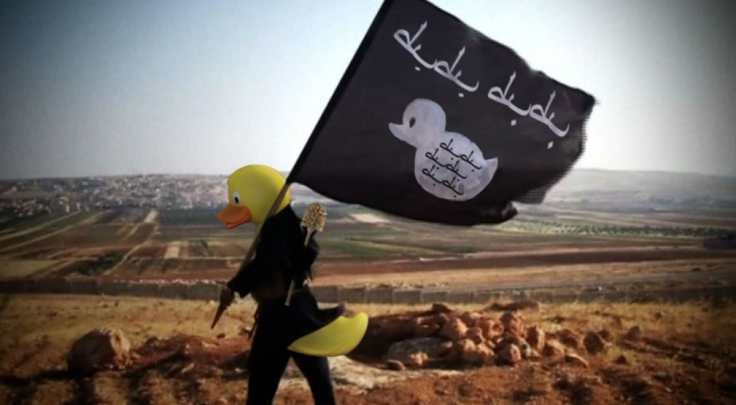Trolling Isis gives cheap laughs but an Anonymous digital blockade would be a real victory

Humour is a rare thing in international terrorism. There aren't a lot of laughs in genocide, slaughter and beheadings.
So, in that sense, the announcement by Anonymous of a mass trolling of ISIS might be welcomed. The use of goats and the hashtag #daeshbags may well produce some memorable memes in a propaganda assault where the aim is to ridicule and belittle the enemy. It's the modern strategic equivalent of Charlie Chaplin's Great Dictator. Mock and undermine to win hearts and minds.
It will, of course, change nothing.
Anonymous say that, for one thing, it will show IS (Daesh) the scale of the opposition to them, give them a real sense of the strength of the unity they are up against. You would think that they know that already – or if they didn't know it from the reaction to the Paris attacks, then they may well not be watching the same news programmes as us (who knew?).
RELEASE: 5 ISIS members identified by Anonymous pic.twitter.com/nr5tZ2n2Zc
— Anonymous (@YourAnonNews) December 2, 2015The mockery is also supposed to expose the hypocrisy of their stance. The gulf between their version of reality and ours. For that to work, of course, we would need to share the same values in the first place. Without a communal respect for democracy, equality and sanity, it's difficult to see how the most cutting of goat gags could work. It'd have to be some pretty sharp writing to cut across that cultural divide.
Indeed, the mockery may do more harm than good. Isis feeds, for its recruitment, on a strong sense of alienation. Driving a herd of goats through the gap between the values of civilisation and those of a Middle Age brutality would just serve to shore up the sense of difference between 'them and us'. That same sense of difference which has led recruits from Tower Hamlets, Bradford and elsewhere to Syria.
The mockery may do more harm than good. Isis feeds, for its recruitment, on a strong sense of alienation.
Rather braver mockery has already been undertaken in Iraq, where a TV show called State of Myths parodies Isis, including claiming one of their leaders was hatched from an egg. In Syria, actors have performed sketches with actors portraying Isis leaders smoking and drinking alcohol. There have, of course, been death threats to the performers but, aside from shoring up opinions on both sides of the divide, and an admiration for the sheer guts of the writers and performers, little has changed.
You can look elsewhere in the fun world of international bloodshed for precedent. Whole countries have indulged – Canada's 'trolling' of Russia during the invasion of the Ukraine, posting graphics to help 'confused' Russian soldiers, escalated from an exchange of 'educative' maps to pictures of toys tanks to enable the recognition of enemy forces. These exchanges were far removed from the traditional diplomacy of high-ceilinged foreign ministries and in poses which would be instantly dropped if those diplomats ever met face-to-face.
A bloodier version took place in 2012 with the Israeli Defence Force's live blogging and tweeting of its attack on Hamas in the Gaza Strip as a form of goading and gloating. Tweeting as bombs fell, it was as vivid a piece of digital propaganda as any government could come up with.
Should we cease using Islamic State, Isis or Isil and begin using 'Daesh'?
IS fighters and leaders hate the word - it's an Arabic acronym of "al-Dawla al-Islamiya fi Iraq wa ash-Sham" – meaning the Islamic State of Iraq and al-Shams – but when spoken Daesh sounds similar to the Arabic words translating to "the sowers of discord" (Dahes) or "one who crushes underfoot" (Daes). IS threatened "to cut the tongue of anyone who publicly used the acronym Daesh, instead of referring to the group by its full name".
For all the digital mockery, Russia remains in the Ukraine. For all the show of strength, Israel and Palestine are no nearer any kind of peace. And for all the mockery, Isis won't pay any attention.
We can call them a name they don't much like and use the term Daesh (that'll teach them). We can mock their ideology, and Photoshop ducks and goats into their propaganda. We can mock barbarity in an effort to make it less scary, but the bombs, bullets and knives won't stop.
Oddly, Anonymous had already begun a rather more effective campaign – degrading Isis communications capacity by dragging down their means of propaganda, and therefore of recruitment.
Within weeks of the Charlie Hebdo attacks, almost 1,000 social media accounts were taken down. It's a social media version of splat the rat, of course, and they keep popping up again, but increased cooperation from the social media companies themselves can also begin to drive them away from their digital recruiting stations.
Removing Isis from digital display altogether will be far more effective than parading them as objects of ridicule. That's where we should look. Anonymous and the social media giants might make strange bedfellows, but they'd be a strong alliance against Isis recruitment.
© Copyright IBTimes 2025. All rights reserved.






















